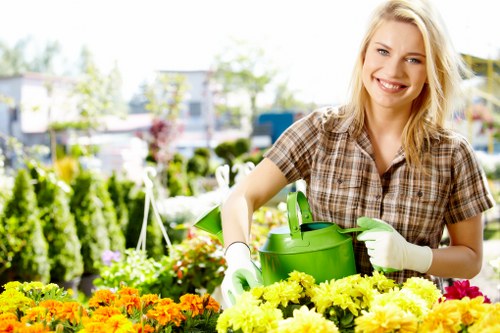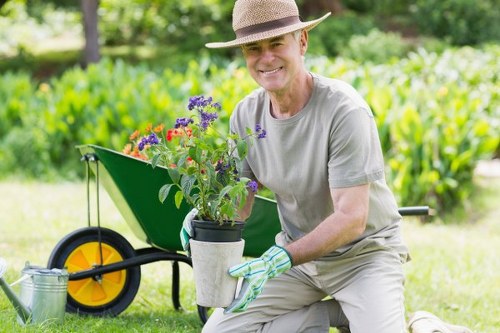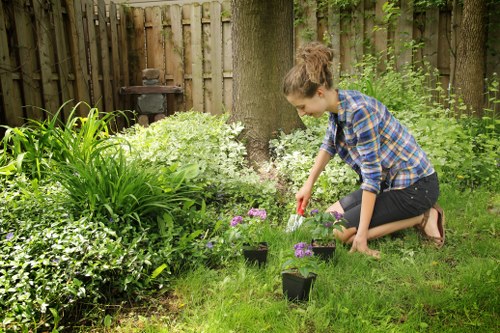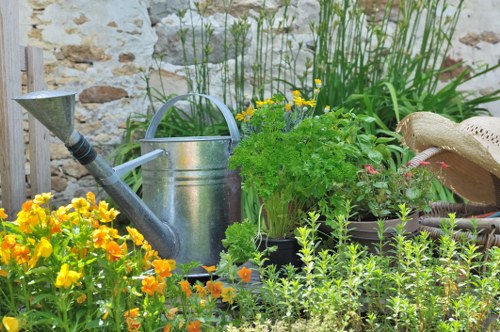Comprehensive Guide to Garden Maintenance in Notting Hill

Welcome to your ultimate resource for garden maintenance in Notting Hill. Nestled in the heart of London, Notting Hill boasts a vibrant community with a keen appreciation for lush, well-kept gardens. Whether you're a seasoned gardener or a novice, maintaining a beautiful garden in this bustling urban area requires specific knowledge and strategies.
In this guide, we'll explore essential tips and techniques tailored to the unique climate and conditions of Notting Hill. From seasonal maintenance to innovative landscaping ideas, you'll find everything you need to keep your garden flourishing year-round.
Understanding the local environment is crucial for successful garden maintenance. Notting Hill's temperate climate, coupled with its compact urban spaces, presents both opportunities and challenges for gardeners.

Seasonal Garden Maintenance
Effective garden maintenance in Notting Hill involves adapting your care routines to the changing seasons. Each season brings its own set of tasks that help ensure your garden remains healthy and vibrant.
Spring is the perfect time for planting new blooms and preparing the soil. Start by clearing out any debris left from winter and fertilizing your plants to encourage growth.
During the summer months, focus on regular watering and weeding. The warmer weather demands consistent attention to keep your plants thriving.

Autumn and Winter Care
As autumn arrives, it's time to prepare your garden for the colder months. This includes pruning dead branches and protecting sensitive plants from frost.
Winter maintenance involves minimalistic care. Ensure that your garden structures are secure and consider using mulch to insulate plant roots.
By following seasonal guidelines, you can maintain a healthy garden that withstands the test of time and weather.

Choosing the Right Plants
Selecting plants that thrive in Notting Hill's climate is essential for low-maintenance gardens. Opt for native species and those well-suited to urban environments.
Consider incorporating a mix of perennials and annuals to ensure continuous blooming throughout the year. Some excellent choices include lavender, geraniums, and hostas.
Additionally, integrating evergreen plants can provide year-round structure and beauty to your garden.

Soil Health and Fertilization
Healthy soil is the foundation of a thriving garden. Regularly test your soil's pH levels and nutrient content to determine the best fertilization strategy.
Organic fertilizers are highly recommended as they improve soil structure and promote beneficial microbial activity.
Implementing a proper fertilization schedule can significantly enhance plant growth and resilience.
Pest Control Strategies
Managing pests is a critical aspect of garden maintenance. Adopt integrated pest management (IPM) techniques to control unwanted insects and diseases.
Regularly inspect your plants for signs of infestation and take immediate action when necessary.
- Use natural predators like ladybugs to control aphids.
- Apply neem oil or insecticidal soaps to deter pests.
- Maintain garden cleanliness to prevent pest breeding grounds.
Effective pest control ensures the health and longevity of your garden.
Landscaping Ideas for Notting Hill
Enhancing your garden's aesthetic appeal involves thoughtful landscaping. Incorporate elements that reflect the unique charm of Notting Hill.
Consider using colorful flower beds, ornate garden furniture, and decorative planters to create an inviting space.
Additionally, integrating vertical gardening or container gardening can maximize space in smaller gardens.
Hardscaping Essentials
Hardscaping elements like paths, patios, and fences add functionality and structure to your garden.
Choose materials that complement the overall design and are suitable for Notting Hill's climate conditions.
- Install permeable paving to enhance drainage.
- Incorporate seating areas for relaxation and social gatherings.
- Use trellises or pergolas to support climbing plants.
Proper hardscaping can transform your garden into a harmonious and practical outdoor space.
Sustainable Gardening Practices
Embracing sustainability in garden maintenance not only benefits the environment but also enhances the resilience of your garden.
Implementing rainwater harvesting systems can reduce water consumption and ensure adequate hydration for your plants.
Additionally, using compost and mulch promotes soil fertility and reduces the need for chemical fertilizers.
Professional Garden Maintenance Services
While DIY gardening is rewarding, professional garden maintenance services offer expertise and efficiency that can elevate your garden's health and appearance.
Experts in Notting Hill understand the local climate and soil conditions, enabling them to provide tailored care for your garden.
- Regular lawn care and trimming.
- Seasonal planting and pruning.
- Pest and disease management.
Hiring professionals ensures consistent and comprehensive garden maintenance.
DIY vs. Professional Services
Deciding between DIY and professional garden maintenance depends on your time, skills, and the complexity of your garden.
If you have the passion and knowledge, DIY can be fulfilling and cost-effective. However, for extensive or specialized tasks, professionals offer invaluable assistance.
Consider a hybrid approach where you handle routine tasks and hire experts for more demanding projects.
Maintaining Garden Aesthetics Year-Round
Consistent care is key to preserving your garden's beauty throughout the year. Implementing a regular maintenance schedule helps address issues promptly and keeps your garden in top shape.
Incorporate seasonal plants and decorations to refresh your garden's look and adapt to changing weather conditions.
Regularly assess your garden's health and make adjustments as needed to maintain its appeal.
Innovative Gardening Techniques
Explore modern gardening techniques to enhance your garden's functionality and sustainability. Techniques such as drip irrigation, hydroponics, and companion planting can optimize growth and resource use.
Integrating technology, like smart irrigation systems, can automate watering schedules and improve efficiency.
Staying updated with the latest gardening trends ensures your garden remains innovative and resilient.
Garden Tools and Equipment
Having the right tools is essential for effective garden maintenance. Invest in high-quality equipment to make tasks easier and more efficient.
Essential tools include:
- Pruning shears and loppers for trimming.
- Garden gloves to protect your hands.
- Spades and trowels for planting and soil management.
Regular maintenance of your tools ensures their longevity and performance.
Community and Resources
Engaging with the local gardening community in Notting Hill provides access to valuable resources and support. Participate in gardening clubs, workshops, and online forums to exchange knowledge and experiences.
Utilize local nurseries and garden centers for plant selections and expert advice.
Connecting with fellow gardeners fosters a sense of community and enhances your gardening journey.
Legal Considerations
Ensure your garden maintenance practices comply with local regulations and community guidelines. Familiarize yourself with Notting Hill's bylaws regarding signage, fencing, and plant restrictions.
Obtaining necessary permits for large-scale landscaping or hardscaping projects is crucial to avoid legal complications.
- Check zoning laws before making significant changes.
- Adhere to property line boundaries when installing structures.
- Respect community aesthetics and guidelines.
Staying informed about legal requirements safeguards your gardening efforts.
Enhancing Privacy
Creating a private oasis in your garden enhances relaxation and enjoyment. Implementing privacy screens, hedges, or fences can provide seclusion within your outdoor space.
Using tall plants or trellises with climbing vines adds both privacy and aesthetic appeal.
Thoughtful placement of garden structures ensures a balanced and private environment.
Seasonal Planting Calendar
Following a seasonal planting calendar helps optimize your garden's productivity and appearance. Plan your planting schedule based on the specific needs of each plant and the local climate.
春天:
- Planting bulbs like tulips and daffodils.
- Sowing seeds for early vegetables.
- Pruning spring-flowering shrubs.
夏天:
- Transplanting seedlings outdoors.
- Maintaining moisture levels with regular watering.
- Harvesting summer vegetables and fruits.
秋天:
- Planting perennials for next spring.
- Leaf removal and composting.
- Preparing garden beds for winter.
冬天:
- Protecting plants from frost.
- Planning for next year's garden.
- Minimal maintenance activities.
Adhering to this calendar ensures a productive and beautiful garden throughout the year.
Water Management
Effective water management is critical for garden health, especially in urban areas like Notting Hill where water resources may be limited.
Implement rainwater harvesting systems to collect and reuse water for your plants.
Drip irrigation systems provide targeted watering, reducing waste and ensuring plants receive adequate moisture.
Garden Lighting
Incorporating lighting into your garden enhances its beauty and functionality during the evening hours.
Use solar-powered lights or LED fixtures to illuminate pathways, highlight plant features, and create ambiance.
- Pathway lights improve safety and accessibility.
- Spotlights can accentuate focal points like trees or sculptures.
- String lights add a cozy and inviting atmosphere.
Thoughtful lighting design transforms your garden into a magical retreat after dark.
Garden Furniture and Accessories
Choosing the right furniture and accessories can significantly enhance your garden's comfort and style.
Select durable materials that withstand weather conditions, such as treated wood, metal, or resin.
Incorporate comfortable seating, decorative elements, and functional pieces like benches or tables to create an inviting space.
Wildlife-Friendly Gardening
Promote biodiversity by creating a wildlife-friendly garden. Encourage beneficial insects, birds, and other wildlife to inhabit your space.
Plant diverse species that provide food and shelter for various creatures.
- Install birdhouses and bat boxes.
- Grow nectar-rich flowers to attract pollinators.
- Create water sources like birdbaths.
A wildlife-friendly garden contributes to a balanced and healthy ecosystem.
Vertical Gardening Solutions
Maximize space in small gardens with vertical gardening techniques. Utilize walls, fences, and trellises to grow plants upwards.
Choose plants suitable for vertical growth, such as climbing vines, herbs, and succulents.
Vertical gardens not only save space but also add visual interest and texture to your outdoor area.
Composting and Soil Enrichment
Composting transforms kitchen and garden waste into rich, organic matter that enhances soil fertility.
Set up a compost bin in your garden to recycle organic materials like vegetable scraps, leaves, and grass clippings.
- Aerate the compost regularly to speed up decomposition.
- Balance green and brown materials to maintain optimal moisture and airflow.
- Use finished compost to enrich garden beds and improve plant health.
Composting is an eco-friendly practice that benefits your garden and the environment.
Mulching Techniques
Mulching helps retain soil moisture, suppress weeds, and regulate soil temperature.
Apply a layer of organic mulch, such as wood chips or straw, around your plants.
Regularly replenish mulch to maintain its effectiveness and appearance.
Garden Safety Tips
Maintaining a safe garden environment is paramount. Implement safety measures to prevent accidents and ensure a pleasant gardening experience.
Keep pathways clear of obstacles and maintain tools in good condition.
- Wear appropriate protective gear, such as gloves and sturdy footwear.
- Store chemicals and tools securely away from children and pets.
- Be mindful of weather conditions to avoid hazards like slippery surfaces.
Prioritizing safety ensures a secure and enjoyable garden.
Enhancing Soil Drainage
Proper soil drainage prevents waterlogging and root diseases. Assess your garden's drainage and implement solutions as needed.
Incorporate raised beds or improve soil structure with organic matter to enhance drainage.
Installing drainage systems, such as French drains, can effectively manage excess water.
Pruning and Trimming
Regular pruning and trimming are essential for plant health and garden aesthetics.
Remove dead or diseased branches to promote healthy growth and prevent the spread of issues.
- Prune flowering plants after blooms fade to encourage future blossoms.
- Trim hedges to maintain their shape and density.
- Cut back overgrown shrubs to enhance airflow and sunlight penetration.
Consistent pruning ensures a well-maintained and visually appealing garden.
Integrated Pest Management (IPM)
IPM is a sustainable approach to managing pests by combining biological, cultural, and chemical methods.
Monitor pest populations and use targeted treatments to minimize environmental impact.
Encourage natural predators and reduce pesticide use for a balanced ecosystem.
Garden Planning and Design
Effective garden planning and design create a harmonious and functional outdoor space.
Consider factors like sunlight, soil type, and plant compatibility when designing your garden layout.
- Create zones for different activities, such as dining, relaxation, and gardening.
- Incorporate focal points like water features or sculptures.
- Use design principles like symmetry, balance, and proportion for aesthetic appeal.
Thoughtful planning enhances your garden's beauty and usability.
Edible Gardening
Incorporate edible plants into your garden to enjoy fresh produce and herbs.
Grow vegetables like tomatoes, lettuce, and peppers, as well as culinary herbs such as basil and rosemary.
Edible gardens are both practical and rewarding, providing delicious additions to your meals.
Maintaining Garden Tools
Proper maintenance of your garden tools ensures their longevity and effectiveness.
Clean tools after each use to prevent rust and remove debris.
- Sharpen blades regularly for precise cutting.
- Store tools in a dry, organized space.
- Inspect tools for damage and replace parts as needed.
Well-maintained tools make gardening tasks easier and more efficient.
DIY Garden Projects
Engage in DIY garden projects to personalize your outdoor space and enhance its functionality.
Create raised beds, build compost bins, or install vertical planters to add versatility to your garden.
DIY projects foster creativity and allow you to tailor your garden to your specific needs and preferences.
Conclusion
Maintaining a beautiful garden in Notting Hill is a rewarding endeavor that enhances your living space and contributes to the community's vibrant atmosphere. By following the tips and strategies outlined in this guide, you can ensure your garden remains healthy, attractive, and sustainable throughout the year.
Whether you choose to undertake garden maintenance yourself or seek professional services, dedication and knowledge are key to achieving your gardening goals.
Contact us today to learn more about our expert garden maintenance services in Notting Hill and let us help you create the garden of your dreams. Book your service now and transform your outdoor space into a lush, thriving oasis.